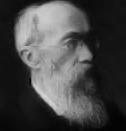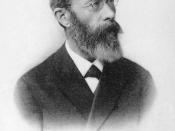William Wundt, born in Baden, Germany on August 16, 1832, was the son of a Lutheran pastor. He was quite the studious boy, and solitary at that. At the ripe age of 19, he was sent to Tubingen, Heidelburg and Berlin to study medicine. Despite his family's wishes, he was more interested in the science what makes people tick, then a medical career.
Wundt became assistant professor at Heidelburg in 1864 and, three years later, developed a course called physiological psychology. This class studied the area between physiology and psychology. This philosophy would eventually develop into his major publishing, The Principals of Physiological Psychology, which was released in 1873 and 1874.
Wundt, like most others of his time, fully believed in the Spinozan idea of psychophysical parallelism. This is the thought that every physical event has a mental counterpart and every mental event has a physical counterpart.
He also noted that the availability of a measurable stimuli (and reactions) could make psychological events open to something such as experimental tactic.
This opposed belief of all earlier philosophers, such as Kant.
Wundt developed a method to contemplate one's own thoughts, feelings and sensations. He said that the researcher should carefully observe some simple event, one that could be measured to a quality, intensity or duration. He should then record all responses to those events. Don't forget that in German philosophy of that time, all sensations were considered physiological events, and therefore they were internal to the mind, even though sensation is something that is outside the mind. In today's time, what we might call observation was called Wundt introspection back in the day.
After founding this idea, Wundt continued on to become chair of "inductive philosophy" at Zurich in 1874, then professor of philosophy at Leipzig, where he remained for...


